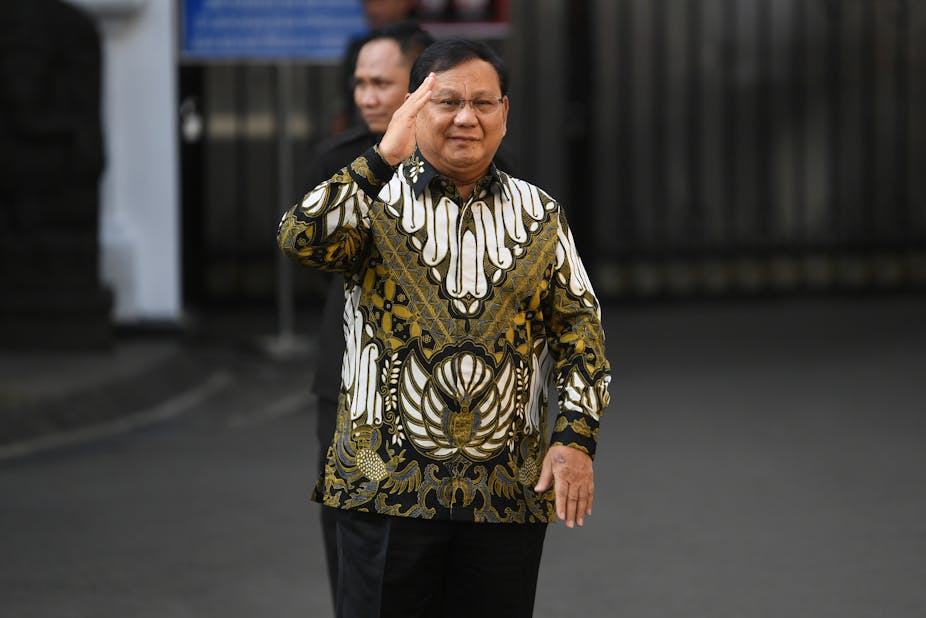One year after securing a new title as defence minister of Southeast Asia’s largest economy, Prabowo Subianto was finally able to visit America again in October.
The trip was made possible by the US government’s decision to lift its two-decade ban on the former army general accused of masterminding various human rights abuses since the late 1970s.
Activists criticised the decision as “a loss for human rights.”
Experts argue that the US decision is part of its strategies to balance China’s growing power and influence in the region.
During his visit, Prabowo met US Defence Secretary Mark Esper at the Pentagon. They agreed to improve military and maritime security cooperation between the countries.
However, despite the controversial US diplomatic efforts to bring in Prabowo, I argue that the visit will not lead to significant defence industry cooperation between the two countries.
Here’s why.
Underdeveloped relationship
The US has been one of the top target countries for Indonesia’s defence diplomatic activities since the early 2000s. This is because of its superpower status and Indonesia’s dependence on US weapon systems during the New Order era.
In 2015, the two countries agreed on comprehensive defence cooperation comprising: research and development; joint military exercises; education and training; and arms procurement.
However, despite the agreement, the defence industry relationship between Indonesia and the US is still underdeveloped.
One of the reasons is related to US restrictions on defence technology transfers.
The US is known to have the most complex and sophisticated export control system in the world, under which the US will share technologies only with allies and partners.
And for its very sensitive technologies, the US does not even share with allies. For example, in 2015 the US refused to transfer four core technologies connected to its F-35 fighter jets to South Korea for the KF-X jet project, which South Korea was developing with Indonesia.
Such policies make the US an unfavourable partner for Indonesia to build its local defence industry.
Unmet needs
Indonesia has been developing its defence industry since 2009. This work has intensified under President Joko “Jokowi” Widodo.
With limited opportunities from the US, Jokowi has instructed Defence Minister Prabowo Subianto to visit many countries, including Turkey, China and France, to explore the possibilities of partnerships with Indonesia’s defence industry.
Indonesia’s long-time defence industry cooperation with Turkey has led to a partnership between Indonesian weapon maker Pindad and Turkey’s FNSS Defence Systems to develop Kaplan medium tanks. Prabowo and Turkish Defence Minister Hulusi Akar have agreed to improve defence industry cooperation between their countries.
France had offered to transfer the technology of its Rafale fighter jet to Indonesia since 2015. This year Prabowo and French Armed Forces Minister Florence Parly are ready to sign a Defence Cooperation Agreement (DCA).
As for China, Indonesia has tried to acquire a licence to produce China’s C-705 missile since 2013.
During Prabowo’s visits to these countries and many others, he has been impulsively attempting to buy major weapon systems. Some of the systems on Prabowo’s purchase list are American-made. But there were no talks on defence industry cooperation that could benefit Indonesia during his visit to the US.
The last time Indonesia benefited from the US was in the mid-1980s. In 1986, Indonesia managed to clinch a deal to manufacture airframe parts for US F-16 fighter jets being exported to other countries.
But since then Indonesia has only been a customer for the US military industry. There has been minimal defence industry cooperation between Indonesia and the US.
Prabowo-Esper’s joint statement after their meeting is another testament that no significant progress has been made on defence industry cooperation. There is no mention of it at all.
The statement says only that both countries will “enhance bilateral military-to-military activities and work together on maritime security”, as well as cooperate in recovering the remains of US personnel lost in Indonesia during the second world war.
In a nutshell, it is still too early to say whether Prabowo’s visit to the US will lead to a significant improvement in defence industry cooperation between the two countries.


